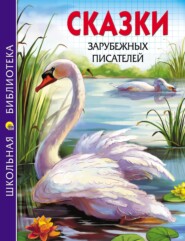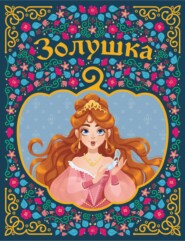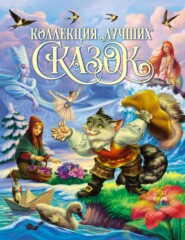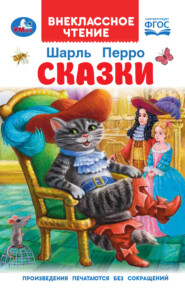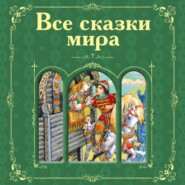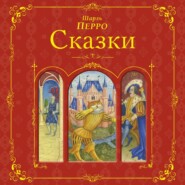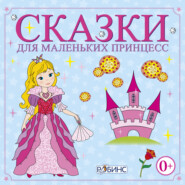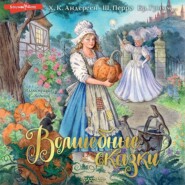По всем вопросам обращайтесь на: info@litportal.ru
(©) 2003-2024.
✖
Cinderella and Other Stories
Настройки чтения
Размер шрифта
Высота строк
Поля
The princess was already fully dressed, and in most magnificent style. As he helped her to rise, the prince refrained from telling her that her clothes, with the straight collar which she wore, were like those to which his grandmother had been accustomed. And in truth, they in no way detracted from her beauty.
They passed into an apartment hung with mirrors, and were there served with supper by the stewards of the household, while the fiddles and oboes played some old music—and played it remarkably well, considering they had not played at all for just upon a hundred years. A little later, when supper was over, the chaplain married them in the castle chapel, and in due course, attended by the courtiers in waiting, they retired to rest.
They slept but little, however. The princess, indeed, had not much need of sleep, and as soon as morning came the prince took his leave of her. He returned to the city, and told his father, who was awaiting him with some anxiety, that he had lost himself while hunting in the forest, but had obtained some black bread and cheese from a charcoal-burner, in whose hovel he had passed the night. His royal father, being of an easy-going nature, believed the tale, but his mother was not so easily hoodwinked. She noticed that he now went hunting every day, and that he always had an excuse handy when he had slept two or three nights from home. She felt certain, therefore, that he had some love affair.
Two whole years passed since the marriage of the prince and princess, and during that time they had two children. The first, a daughter, was called ‘Dawn’ while the second, a boy, was named ‘Day’ because he seemed even more beautiful than his sister.
Many a time the queen told her son that he ought to settle down in life. She tried in this way to make him confide in her, but he did not dare to trust her with his secret. Despite the affection which he bore her, he was afraid of his mother, for she came of a race of ogres, and the king had only married her for her wealth.
It was whispered at the Court that she had ogrish instincts, and that when little children were near her she had the greatest difficulty in the world to keep herself from pouncing on them.
No wonder the prince was reluctant to say a word.
But at the end of two years the king died, and the prince found himself on the throne. He then made public announcement of his marriage, and went in state to fetch his royal consort from her castle. With her two children beside her she made a triumphal entry into the capital of her husband’s realm.
Some time afterwards the king declared war on his neighbour, the Emperor Cantalabutte. He appointed the queen-mother as regent in his absence, and entrusted his wife and children to her care.
He expected to be away at the war for the whole of the summer, and as soon as he was gone the queen-mother sent her daughter-in-law and the two children to a country mansion in the forest. This she did that she might be able the more easily to gratify her horrible longings. A few days later she went there herself, and in the evening summoned the chief steward.
‘For my dinner to-morrow,’ she told him, ‘I will eat little Dawn.’
‘Oh, Madam!’ exclaimed the steward.
‘That is my will,’ said the queen; and she spoke in the tones of an ogre who longs for raw meat.
‘You will serve her with piquant sauce,’ she added.
The poor man, seeing plainly that it was useless to trifle with an ogress, took his big knife and went up to little Dawn’s chamber. She was at that time four years old, and when she came running with a smile to greet him, flinging her arms round his neck and coaxing him to give her some sweets, he burst into tears, and let the knife fall from his hand.
Presently he went down to the yard behind the house, and slaughtered a young lamb. For this he made so delicious a sauce that his mistress declared she had never eaten anything so good.
At the same time the steward carried little Dawn to his wife, and bade the latter hide her in the quarters which they had below the yard.
Eight days later the wicked queen summoned her steward again.
‘For my supper,’ she announced, ‘I will eat little Day.’
The steward made no answer, being determined to trick her as he had done previously. He went in search of little Day, whom he found with a tiny foil in his hand, making brave passes—though he was but three years old—at a big monkey. He carried him off to his wife, who stowed him away in hiding with little Dawn. To the ogress the steward served up, in place of Day, a young kid so tender that she found it surpassingly delicious.
So far, so good. But there came an evening when this evil queen again addressed the steward.
‘I have a mind,’ she said, ‘to eat the queen with the same sauce as you served with her children.’
This time the poor steward despaired of being able to practise another deception. The young queen was twenty years old, without counting the hundred years she had been asleep. Her skin, though white and beautiful, had become a little tough, and what animal could he possibly find that would correspond to her? He made up his mind that if he would save his own life he must kill the queen, and went upstairs to her apartment determined to do the deed once and for all. Goading himself into a rage he drew his knife and entered the young queen’s chamber, but a reluctance to give her no moment of grace made him repeat respectfully the command which he had received from the queen-mother.
‘Do it! do it!’ she cried, baring her neck to him; ‘carry out the order you have been given! Then once more I shall see my children, my poor children that I loved so much!’
Nothing had been said to her when the children were stolen away, and she believed them to be dead.
The poor steward was overcome by compassion. ‘No, no, Madam.’ he declared; ‘you shall not die, but you shall certainly see your children again. That will be in my quarters, where I have hidden them. I shall make the queen eat a young hind in place of you, and thus trick her once more.’
Without more ado he led her to his quarters, and leaving her there to embrace and weep over her children, proceeded to cook a hind with such art that the queen-mother ate it for her supper with as much appetite as if it had indeed been the young queen.
The queen-mother felt well satisfied with her cruel deeds, and planned to tell the king, on his return, that savage wolves had devoured his consort and his children. It was her habit, however, to prowl often about the courts and alleys of the mansion, in the hope of scenting raw meat, and one evening she heard the little boy Day crying in a basement cellar. The child was weeping because his mother had threatened to whip him for some naughtiness, and she heard at the same time the voice of Dawn begging forgiveness for her brother.
The ogress recognised the voices of the queen and her children, and was enraged to find she had been tricked. The next morning, in tones so affrighting that all trembled, she ordered a huge vat to be brought into the middle of the courtyard. This she filled with vipers and toads, with snakes and serpents of every kind, intending to cast into it the queen and her children, and the steward with his wife and serving-girl. By her command these were brought forward, with their hands tied behind their backs.
There they were, and her minions were making ready to cast them into the vat, when into the courtyard rode the king! Nobody had expected him so soon, but he had travelled post-haste. Filled with amazement, he demanded to know what this horrible spectacle meant. None dared tell him, and at that moment the ogress, enraged at what confronted her, threw herself head foremost into the vat, and was devoured on the instant by the hideous creatures she had placed in it.
The king could not but be sorry, for after all she was his mother; but it was not long before he found ample consolation in his beautiful wife and children.
PUSS IN BOOTS (#u25c46fb1-697b-5171-9565-d509e0f33e37)
A certain miller had three sons, and when he died the sole worldly goods which he bequeathed to them were his mill, his ass, and his cat. This little legacy was very quickly divided up, and you may be quite sure that neither notary nor attorney were called in to help, for they would speedily have grabbed it all for themselves.
The eldest son took the mill, and the second son took the ass. Consequently all that remained for the youngest son was the cat, and he was not a little disappointed at receiving such a miserable portion.
‘My brothers,’ said he, ‘will be able to get a decent living by joining forces, but for my part, as soon as I have eaten my cat and made a muff out of his skin, I am bound to die of hunger.’
These remarks were overheard by Puss, who pretended not to have been listening, and said very soberly and seriously:
‘There is not the least need for you to worry, Master. All you have to do is to give me a pouch, and get a pair of boots made for me so that I can walk in the woods. You will find then that your share is not so bad after all.’
Now this cat had often shown himself capable of performing cunning tricks. When catching rats and mice, for example, he would hide himself amongst the meal and hang downwards by the feet as though he were dead. His master, therefore, though he did not build too much on what the cat had said, felt some hope of being assisted in his miserable plight.
On receiving the boots which he had asked for, Puss gaily pulled them on. Then he hung the pouch round his neck, and holding the cords which tied it in front of him with his paws, he sallied forth to a warren where rabbits abounded. Placing some bran and lettuce in the pouch, he stretched himself out and lay as if dead. His plan was to wait until some young rabbit, unlearned in worldly wisdom, should come and rummage in the pouch for the eatables which he had placed there.
Hardly had he laid himself down when things fell out as he wished. A stupid young rabbit went into the pouch, and Master Puss, pulling the cords tight, killed him on the instant.
Well satisfied with his capture, Puss departed to the king’s palace. There he demanded an audience, and was ushered upstairs. He entered the royal apartment, and bowed profoundly to the king.
‘I bring you, Sire.’ said he, ‘a rabbit from the warren of the marquis of Carabas (such was the title he invented for his master), which I am bidden to present to you on his behalf.’
‘Tell your master,’ replied the king, ‘that I thank him, and am pleased by his attention.’
Another time the cat hid himself in a wheatfield, keeping the mouth of his bag wide open. Two partridges ventured in, and by pulling the cords tight he captured both of them. Off he went and presented them to the king, just as he had done with the rabbit from the warren. His Majesty was not less gratified by the brace of partridges, and handed the cat a present for himself.
For two or three months Puss went on in this way, every now and again taking to the king, as a present from his master, some game which he had caught. There came a day when he learned that the king intended to take his daughter, who was the most beautiful princess in the world, for an excursion along the river bank.
‘If you will do as I tell you,’ said Puss to his master, ‘your fortune is made. You have only to go and bathe in the river at the spot which I shall point out to you. Leave the rest to me.’
The marquis of Carabas had no idea what plan was afoot, but did as the cat had directed.
While he was bathing the king drew near, and Puss at once began to cry out at the top of his voice:
‘Help! help! the marquis of Carabas is drowning!’
At these shouts the king put his head out of the carriage window. He recognised the cat who had so often brought him game, and bade his escort go speedily to the help of the marquis of Carabas.







